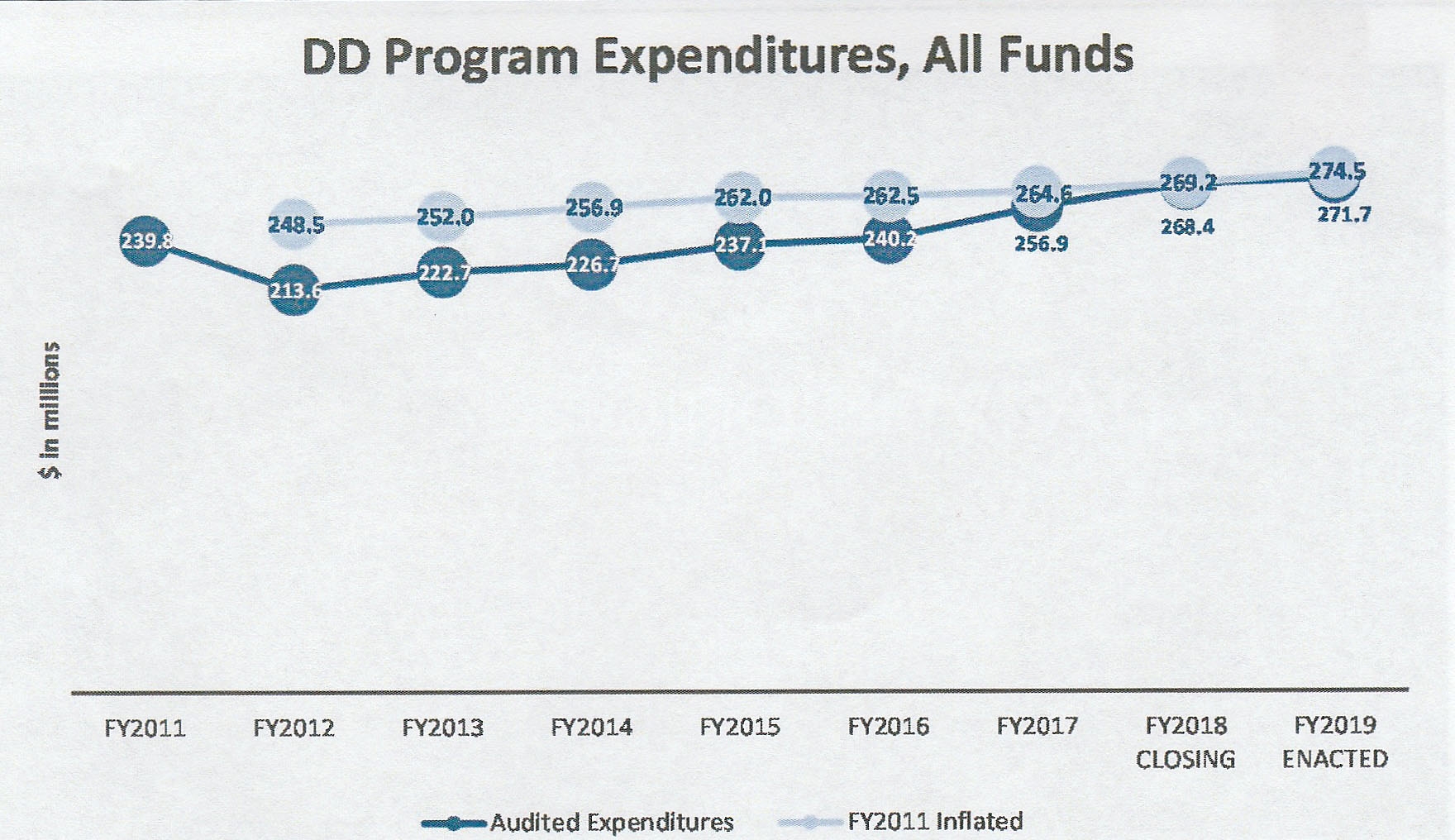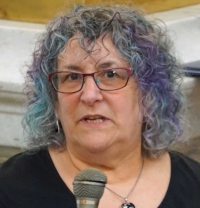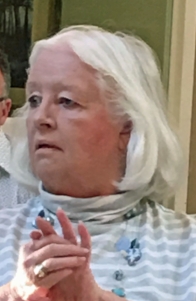By Gina Macris
This article has been updated.
As others had done before him, Tom Kane told members of the House Finance Committee that he “could not stress enough” the importance of the General Assembly approving an additional $6.1 million to lift the poverty-level pay of some 4,000 front-line employees of private agencies under contract with the state to care for adults with developmental disabilities.
At the same time, Kane, CEO of AccessPoint RI, one of those private agencies, said in a hearing April 11 that the overall funding for developmental disabilities is only about 50 percent of what is needed for service providers to regain the financial stability they once had and help their clients receive the supports they need and deserve.
All together Governor Gina Raimondo seeks General Assembly approval for raising the currently enacted developmental disability budget of $246.2 million by $10.5 million over the next 14 months, with $4.4 million of the increase applied before June 30. Another $6.1 million would be added for the fiscal year beginning July 1, for a total of $256.7 in the fiscal year ending June 30, 2018.
Kane explained to members of the Finance Committee’s Human Services Subcommittee, led by Rep. Teresa A. Tanzi, D-South Kingstown and Narragansett), the different kinds of pitfalls he saw in Raimondo’s attempts to offset the cost of the raises by cutting expenses in other areas – or not covering some necessary spending at all.
For example, Kane said, AccessPoint had a $107,000 increase in health insurance rates this year. ”There is no money” to cover that cost, he said. “We spend almost $1.2 million in health insurance for 158 people,” he said. Kane said he could not expect his employees, many of whom make less than $11 an hour, to contribute more to health insurance, so other adjustments were made. He did not elaborate.
“But at some point there’s going to be a collision between all these additional costs” and direct care workers, Kane said. In written remarks, he said the “cost of other insurances, building maintenance, rent, vehicles, fuel and office supplies continue to increase, adding to the financial strain on organizations. These costs should not be seen as extraneous. They directly relate to our ability to focus our full attention on good quality service provision,” Kane said.
He also zeroed in on some line-item savings that Raimondo has budgeted to offset the cost of the second consecutive raise for direct care workers, particularly the plan to reduce group home costs by $2.1 million in state funds. That ongoing effort, driven by economic and policy considerations, aims to move group home residents to less costly shared living arrangements in private homes - a process that requires clients to actively agree to the change.
During the transition, there must be a consideration for maintaining the living arrangements of the individuals left behind in the group homes, Kane said, recalling a case in which two of four people in one AccessPoint home opted for shared living. Because the agency could not afford to keep the house operating with only two residents, it sought supplemental funds from the Division of Developmental Disabilities for a few months to cover outstanding expenses while it figured out its long-range plan, Kane said. The home finally closed, he said.
The example illustrates how, during a transition, “you are balancing two systems at the same time, “ Kane said.
“If you don’t pay attention to the current system with the same amount of zeal as the new system, people will get lost,” he said.
In fact, the state so far has been unable to realize much savings from the emphasis on shared living, only $100,000 of a target of $2.6 million in state funds in the current fiscal year, according to officials of the Department of Behavioral Healthcare, Developmental Disabilities and Hospitals (BHDDH).
Since last July, a total of 48 group home residents have committed to shared living. That figure is 18 shy of a target of 66 individuals for the fiscal year ending June 30.
Kerri Zanchi, Director of the Division of Developmental Disabilities, said that of the 48, 28 have moved since December, when the division began addressing issues that were barriers to shared living arrangements, like a need for physical modifications to some houses to make them more easily accessible, as well as extra medical and behavioral supports needed in the host homes. She said the division is also considering a range of other alternatives to group home living.
Ultimately, Kane said, a budget is a “representation of the values of our state.” The care for people with disabilities and the salaries paid to caregivers either will reflect the dignity and respect afforded valuable members of society, or they won’t, Kane said.
“I understand you have a lot of very difficult decisions to make,” he told the legislators, “and the numbers (revenues) aren’t looking great this year, which are going to make all those decisions even tougher.”
But Kane asked them to look at historical spending for developmental disability services, which he said are now only $9 million more than they were in 2010. In the meantime the demands of a 2014 federal consent decree with the U.S. Department of Justice, as well as new Medicaid rules for Home and Community Based Services (HCBS), make the job of supporting individuals with disabilities much more complex and expensive, he said.
Traditionally, he said, support has been provided in “congregate” settings, or facilities “where you have groups of ten people with one staff person. “
“Under the consent decree they have to be either at a job or in the community,” he said. Those settings demand ratios of one staffer for each client, or no more than three clients, depending on the circumstances, Kane said. In addition, the consent decree requires job coaches to be trained to a specific certification. and trained workers will demand higher pay, Kane said.t
The latest statistics indicate the current average pay for direct care workers is $11.14 an hour, before taxes, a figure that reflects a raise of about 32 cents effective last July 1, according to Donna Martin, executive director of the Community Provider Network of Rhode Island (CPNRI), a trade association which represents 25 of some three dozen private providers of developmental disability services.
The hourly reimbursement rate the state pays the employers for direct care workers is $11.91, which includes both wages and most – but not all – of employers’ actual costs for overhead and fringe benefits. That figure is still lower than the hourly reimbursement rate of $12.03 the General Assembly authorized in July, 2011 at the same time it cut a total of $24 million for private provider services, according to a chart prepared by James Parisi of the Rhode Island Federation of Teachers and Health Professionals.
In October, 2011, three months after the General Assembly acted, BHDDH reduced the actual reimbursement rate to $10.66 an hour, according to Parisi’s calculations. Since then, the rate has been climbing incrementally to its current level of $11.91.
Parisi represents workers at the Trudeau Center in Warwick, where the starting salary is now $10.71 an hour.
Tori Flis, a service coordinator at one agency, which she did not name, said that even though there has been a slight increase in wages in the last year, the turnover is “just as high.”
Martin, of CPNRI, put the average turnover at one out of three workers a year, or 33 percent, although it varies from one agency to another. Employers are unable to fill one out of six vacancies, and it costs an agency an average of $4900 every time it must search for a replacement and train a new hire, Martin said.
Markella Carnavalle, who works at Trudeau, described the impact that turnover can have on individuals with developmental disabilities.
One client, who had grown attached to a worker who had to leave, was “crying for weeks,” she said.
That person had behavioral issues and didn’t want to work or eat, Carnavalle said. The client believed the worker left because “they didn’t want to be with me,” Carnavalle said, but “you can’t say the person needed more money. They don’t look at it that way.”
“You become a part of their lives and they become a part of yours” over time, Carnavalle said.
Flis, meanwhile, said the workers she supervises all have two and three jobs to make ends meet. Some work as many as three consecutive 12-hour shifts at different agencies – a total of 48 hours straight.
Those kinds of conditions lead to burnout, abuse and neglect, Flis said. The only reason she can afford to work one job at Trudeau is that she is married to a teacher who has a good salary and fringe benefits, including a pension, Flis said.
In another part of the current budget, BHDDH officials and the legislators disagreed on whether there is funding for a developmental disabilities ombudsman, a position approved by the General Assembly last year after a woman died in a state-run group home. The state-run residential system is separate from the private system.
The legislators and a member of the House fiscal advisory staff, Linda Haley, said a total of $170,000 had been included in the BHDDH budget for the position.
Representing BHDDH, Christopher Feisthamel, the chief financial officer, and Zanchi, the developmental disabilities director, both said they understood it was an “unfunded mandate.” Haley and BHDDH officials spoke informally after the hearing but reached no agreement on the status of the position.
(This article has been updated to correct the total cost of health insurance for AccessPoint RI, which is $1.2 million, not $12 million, according to CEO Tom Kane.)























